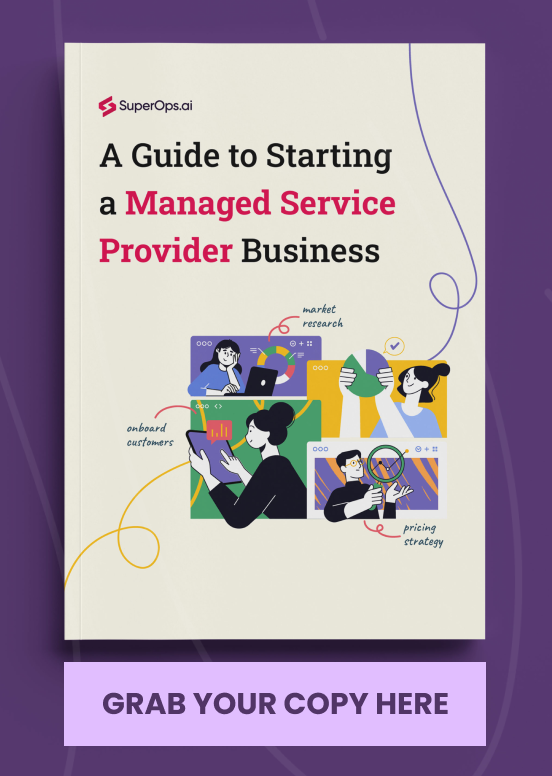MSP owners work tirelessly to build great brands, awesome teams, and an enviable portfolio of clients. But they don’t have to keep at it forever.
Whether it's for personal or professional reasons, there comes a time when you need to exit the company and move on. A properly planned exit from an MSP may not be the final step for you but the first step into a less stressful, more gainful time.
The reasons for you to exit your MSP can vary from personal goals to internal politics and from opportunities (like a great acquisition bid) to a non-conducive business environment and high competition. But whatever the reason for exit, make sure that you’re walking out with certainty, stability, and hope instead of despair. And for this, you need to have everything on this checklist ticked off.
Are you ready to exit your MSP?
Assuming that you are involved full-time in your MSP, you need to first make sure you are ready to sell and move on. There are a few questions that you can ask yourself to get the answer.
1. Am I emotionally ready to move on?
For many MSP owners, the company is not just a service or a team or something they own - it’s a part of their identity. And in such cases, even if an exit is the best option for all parties - their teams, their clients and their families - they are just not able to let go. You have to ask yourself - are you ready to give up being your own boss and the top guy at the MSP? Will you feel fulfilled working as a team member instead of an owner once your company is acquired? In case you’re not joining the buyers, are you ready to take a break? It’s important that regret is not part of your sale.
2. Am I financially ready to sell?
Let’s be honest, working for an MSP at any level is about making money. In terms of being an owner it just means you are also building wealth. Before you decide to sell the MSP you worked hard to build, you have to ensure that you’re financially in a good position to sell.
Whatever your future plans are, this sale has to support at least a part of that - if not the whole. Make sure that your finances are planned for the long term.
3. What are my short-term plans post sale?
Many acquisitions lead to MSP owners joining the larger corporate structure of the company acquiring it. The minimum tenure is kept to ensure that the smaller acquired MSP is properly transitioned into the larger one. This also benefits your team and clients who transition to the buyer. But are you ready to take on such a role? Will you be able to fit into the new company’s structure and culture? On the other hand, if you’re not joining the buyer - would you be comfortable sitting this transition out? These are the questions you must answer for yourself.
4. What are the long-term plans post sale?
You may or may not have a short or long term stay with the buyer but you definitely need to plan the next steps carefully. Until this point you are running your MSP, you are spending 40, 50 or even more hours per week working hard but that’s not going to be there anymore. Even if you are going to be working with the buyer - the workload will differ and you may not stay there forever. Plan out the rest of your post-MSP-owner-life carefully before you take the leap.
So you figure out that you’re ready - financially and emotionally. You know what you want to do after this - in the short and long term. Then what’s next? It’s about finding the right valuation for your company!
Hitting the right valuation
Finding the right valuation for your MSP is not easy but it's something that you must wrap your head around before even thinking about exiting your company. Many times owners handling day-to-day business are pleasantly surprised when they figure out a good valuation for their MSP.
There are many variables that are taken into account while calculating the valuation for your MSP. Some companies come up with the valuation based on total profit or net profit percentage. Many VCs, financial analysts, and private equity companies use Earnings Before Interest Taxes Depreciation and Amortization (EBITDA) value because it partially eliminates industry nuances regarding tax rates and interest rates. It also makes it simple to assign a multiple to EBITDA to value a business.
But it’s not just about crunching numbers it's also about researching. Chat up some recent sellers or talk to industry leaders who constantly look at deal details and can give you some great insight. Also, talk directly with interested buyers and once you have some of those conversations you will realize a more realistic number close to your valuation.
Preparing yourself
Valuation is just one part of it, you need to get educated on every aspect of this sale. Assess the existing prospect options. You can sell to investors, bigger MSPs, just add new partners, or even sell the company to your employees. A multitude of options exist and you need to educate yourself about all of them.
The second thing is some financial planning for yourself. Work with your accountant and learn how you can make this sale with minimal tax implications and impact on your long-term financial planning.
Once you are all prepped up, you wait for the right buyer.
Finding the right buyer to sell your MSP
It’s not just enough to find buyers for your MSP. You need to find the right buyer or rather let the right buyer find you. While you will prefer a buyer from the same industry and understands the business, it’s not always going to work out or be the best deal for you.
There are a lot of VC and private equity firms looking to take a bigger piece of the MSP pie. Some of them will offer you great deals and maybe even let your team continue with their work in peace and help them flourish after your exit. Another thing you can look for is a client with a similar work culture and mission to take over your MSP to make sure it continues to prosper after your exit.
Keep your KPIs strong and be prepared for due diligence. Many people are so engrossed in trying to sell their business that they lose track of the fundamentals and the business suffers. You must ensure that doesn’t happen on your watch and that key metrics like Monthly Recurring Revenue (MRR), efficiency, and growth rate are steady and looking good.
Finally, it’s not just enough to build a profitable, sellable MSP business, you have to get people to know that you are out there. A little bit of networking goes a long way in that regard. Make sure that you put the word out in your network of MSP owners. Hiring M&A advisors also helps. They can actually help you create pitch decks, find and screen buyers and help you with the nitty gritties.
Once you have the right buyers, it’s all about the right time.
Right time to sell/exit your MSP?
As founders and CEOs spend years building and growing an MSP, their goals change over time. And it also means that it’s more of a question of when than if someone is planning to sell their MSP.
Unless you’re forced to sell your MSP due to unforeseen circumstances or had the sale chalked out in your head long back, the right time for the exit can happen when one or more of these four things come together:
1. Stability: You have/can assure future financial stability
Most of the people who start building MSPs are not businessmen but techies. But that doesn’t mean they don’t have business plans. What starts with a goal to be profitable expands to further financial plans and these then develop into retirement plans that are kind of the end goals.
When you see that you can achieve great financial stability for yourself and your dear ones with this sale, that’s a sign to sell.
2. Spirit: You are drained/lack interest
You spent your best years transforming this MSP from a small setup to a large profit-making machine. And through it all, you pushed for more success, better quality, and a great culture. You were driven to achieve more and grow. But at one point, you feel drained and no longer excited about growth. Your best-performing years for this MSP are over and it’s time to move on and take up another challenge or hang your boots up. That’s one reason to start exploring exit options.
3. Stress: Rising risk factors
Growing competition or diminishing returns can be worrisome. So you built and grew a business but it’s only as good as the value it generates. If there are internal and/or external factors that can negatively affect its profits, then that’s a cause to drive down its valuation, and holding onto it longer will be a loss. This means the time to exit the MSP is upon you.
4. Stock Up: Great valuation
A good asset grows in value over time and is usually sold at a great price, much higher than your initial investment. The MSP you build up is just like an asset. So if you see a high-demand market and get a great valuation - it's one of the signs that it’s a great time to exit. M&As in the MSP space have been at an all-time high since the pandemic and this is a great time to make that exit.
And once you decide to exit your MSP..
.. there are still loads of things to do before you finally get to it. Educate yourself well, and make sure that the decisions you make are not only beneficial to you, but also to the team that you built, the buyer, and the clients that you cater to.
After all, how the MSP transitions further, will be your legacy.





